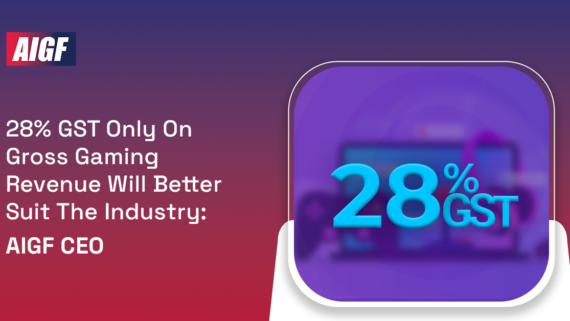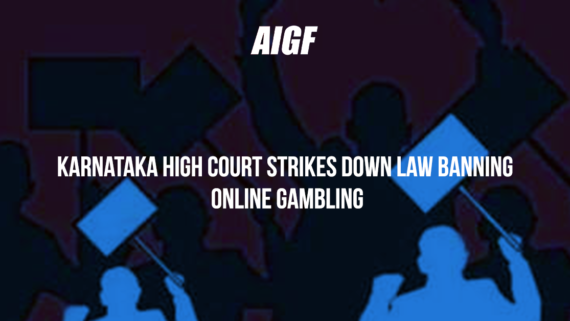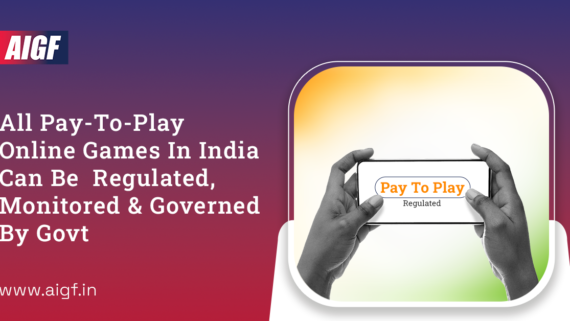The Law Commission assures AIGF to submit their recommendations before 31st August 2018
The Law Commission of India has assured the All India Gaming Federation (AIGF) that they will submit their
recommendations before 31st August 2018 wherein they will advocate legalising the Sport Betting industry to the
Supreme Court of India and the Indian Government.
The All India Gaming Federation (“AIGF”) had submitted a white paper to the Law Commission on June 30, 2017 (“White Paper”) in response to the Appeal of the Law Commission dated May 30, 2017 inviting recommendations for legalizing betting and gambling. Thereafter, the representatives of AIGF had one round of discussion with the Law Commission on July 10, 2017 to present the paper. Law Commission had raised queries with respect to taxation of gaming industry and constitution and powers of the Gaming Commission proposed by AIGF. AIGF is in the process of making submission with respect to these queries.
In response to the queries raised in the Appeal, AIGF has supported legalization of sports betting for inter alia following grounds:
(i) curbing the burgeoning underground sports betting market (ii) such a step is in line with the recommendations in the Lodha Committee’s Report (iii) Peer to peer betting was not currently outlawed by a vast majority of the Gaming Enactments, (iv) the Government stood to gain revenue in the form of taxes and create employment opportunities.
Research has shown that a thriving underground betting market exists[1]. The Lodha Committee’s Report had, while recommending the legalization of betting in cricket, highlighted issues of match/spot fixing which interfered with the integrity of the game. The Report recommended that betting could be dealt with effectively through a robust legal framework.
In the same vein, AIGF had recommended that a regulatory regime would permit authorities to supervise the sports betting market. Regulators could cooperate with operators across the world to exchange information on suspicious activities (including match fixing). This would make the market more transparent.
AIGF has also provided suggestions in relation to:
- Player Protection: Licensed gaming operators to be made to adopt and implement responsible gaming guidelines, monitor gameplay to assess which players are at risk of irresponsible play, verify the age of players, and routinely audit such operators’ systems.
- Anti-corruption: More robust anti- corruption laws with provisions for player verification, avoidance of phishing (i.e. stealing identities online), and auditing operators’ books and accounts.
- Product integrity: Ensure that operators’ gaming products are certified and adhere to technical and operational standards.
- Advertising: Enact advertising guidelines, and ensure that unlicensed operators do not advertise or promote their products in line with practices in other jurisdictions.
AIGF has supported opening up of foreign direct investment (“FDI”) in licensed gaming and lottery operators on a progressive basis, and also suggested removal of the restriction on foreign technology collaborations for entities holding a lottery or gaming license.
The White Paper has recommended a unified online licensing regime for purely of skill/preponderantly of skill (“Skill Games”)[2], rather that state specific laws. Given the vast market potential introduced by the online medium, the White Paper recommended introduced a gaming law in the nature of a central enactment to regulate Skill Games in the online medium (“Unified Online Gaming License”/”Unified Online Gaming License Regime”). The Unified Online Gaming License Regime would also provide for a National Gaming Commission. It was recommended that gaming within brick and mortar gaming houses (“Physical Gaming”) continue to be governed by the respective State legislations.
Despite the offering of Skill Games being protected as a fundamental right under the Constitution, the ambiguity surrounding which games qualify as Skill Games has made it difficult for operators to build sustainable businesses. Most Gaming Enactments are silent on this aspect[3] Hence, the White Paper recommended that:
- A central statute for online gaming contain a list of Skill Games with a mechanism for a National Gaming Commission to make additions to the list after due consideration
- Each State’s legislature adopt the said list for Physical Gaming
The White Paper has suggested possible approaches to achieve above recommendations. The White Paper also stated that the following Acts which would need to be amended: The Indian Contract Act, 1872, The Prevention of Money Laundering Act, 2002, and The Consumer Protection Act, 1986.
The White Paper also highlighted certain other factors which would need to be addressed and included in the Unified Gaming License Regime, in line with the recommendations of the Lodha Committee:
- Measures to Stop Illegal Gaming: Constitute a National Gaming Commission to issue licenses and deal with disputes relating to operators.
- Anti- Money Laundering Provisions: Licensed gaming operators be made to follow KYC norms, and adhere to anti- money laundering provisions, defaulters to be penalized. Digital transactions should be verified and a regulatory requirement to train in AML policies and procedures to be imposed.
- Inclusive Policy Making: A collaborative environment for stakeholders should be created, and a democratic structure consisting of state and district level stakeholders and corporate bodies introduced.
- Promotion of Responsible Gaming: Responsible gaming ought to be at the Centre’s core policy to curb addiction and protect the youth, through enforcing regular audits, player age verification, and introducing responsible gaming guidelines for operators.
- Technology Certification: Technical and operational standards for gambling devices and systems should be prescribed. Additionally, independent organizations should be accredited to certify that operators’s devices/processes adhere to regulatory standards. Finally, routine audits of gambling devices and systems should be carried out.









Comments
No comment yet.